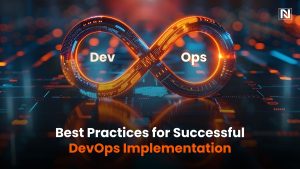
Getting started with DevOps may feel overwhelming, but the benefits are worth it. By streamlining collaboration between development and operations, your teams can work faster and more efficiently. If you’re ready to break down the silos between your development and operations teams, this blog is for you. We’ll show you the foundational steps to launch DevOps in your organization, no matter your level of experience. Let’s explore how to make DevOps a reality!
What is DevOps?
DevOps is a combination of “Development” (Dev) and “Operations” (Ops), aimed at unifying software development and IT operations. It’s a culture, set of practices, and tools that enable faster and more efficient software delivery. DevOps focuses on collaboration between development and operations teams to automate, streamline, and enhance the entire software development lifecycle from coding, testing, and deploying to monitoring and maintaining applications.
Business Benefits of DevOps Implementation
Implementing DevOps within a business offers several key benefits, such as fostering collaboration and improving overall efficiency. Here are the primary business benefits of DevOps implementation:

- Rapid Delivery
DevOps enables continuous integration and continuous delivery (CI/CD), allowing teams to test, refine, and deploy code quickly. This agility reduces product development cycles, accelerating the time to market.
- Cross-functional Teams
By fostering a culture of collaboration between development, operations, and QA teams, DevOps breaks down silos, leading to smoother workflows and higher productivity.
- Faster Feedback Loops
DevOps allows for quick iteration and deployment, enabling faster response to customer feedback and evolving market demands.
- DevSecOps
Security is integrated into the DevOps pipeline through DevSecOps, ensuring that security measures are applied consistently throughout the development process without slowing down deployment.
Best Practices for Successful DevOps Implementation
Implementing DevOps from scratch can significantly improve the collaboration between development and operations teams, streamline workflows, and accelerate software delivery. Here’s a step-by-step guide to get you started:
- Understand DevOps Culture
DevOps is more about culture than tools. Focus on building a collaborative environment where development, operations, and other teams work together to achieve shared goals, such as faster delivery, quality, and continuous improvement.
- Evaluate Your Current Processes
Assess the existing development and operational workflows. Identify bottlenecks in communication, deployment, and testing. This will help you understand which areas need improvement as you move toward DevOps.
- Build a Cross-Functional Team
Form a DevOps team that includes development, operations, and quality assurance members. Ensure they share ownership of code and infrastructure to promote collaboration and accountability.
- Implement Version Control
Use a version control system (like Git) to manage code, configuration files, and scripts. Version control is the foundation of Continuous Integration (CI) and enables better team collaboration.
- Automate Testing and Integration (CI/CD Pipeline)
Set up Continuous Integration (CI) to automatically test and integrate code changes into a shared repository. Use tools like Jenkins, CircleCI, or GitLab CI to automate build and testing processes.
- Infrastructure as Code (IaC)
Adopt Infrastructure as Code (IaC) to manage your infrastructure through code rather than manual processes. Use tools like Terraform, Ansible, or CloudFormation to automate environments’ provisioning, configuration, and scaling.
Did You Know?
According to Statista, In 2023, nearly 54 percent of respondents noted that AI tools are expected to enhance the efficiency and accuracy of their DevSecOps processes and workflows.
According to Markets and Markets, the DevOps market is expected to expand at a CAGR of 19.7% from an estimated USD 10.4 billion in 2023 to USD 25.5 billion by 2028.
- Adopt Containerization
Use containers (e.g., Docker) to create consistent development, testing, and production environments. This ensures the application runs similarly across different stages and reduces deployment issues.
- Continuous Deployment
Implement Continuous Deployment (CD) to automate the release process. Once code passes through automated tests, it should be deployed to production with minimal manual intervention. Use tools like Kubernetes or Docker Swarm to orchestrate deployments.
- Implement Monitoring and Logging
Set up robust monitoring and logging to track your applications’ performance and availability in real-time. Use tools like Prometheus, Grafana, or ELK Stack to detect issues early and improve the system’s reliability.
- Measure Performance and Iterate
Track performance metrics (e.g., deployment frequency, lead time, mean recovery time). Use this data to identify bottlenecks and continuously improve processes and tools.
Following these steps, you can successfully implement DevOps from scratch and achieve faster, more reliable software delivery.
Must Read – What is DevOps and Why is it Important?
The Future of DevOps: Emerging Tech & Trends
DevOps has become the backbone of faster and more efficient software development and deployment as businesses continue to embrace digital transformation. The future of DevOps is being shaped by emerging technologies and evolving practices aimed at enhancing collaboration, automation, and scalability. Here are some key trends and technologies that are expected to shape the future of DevOps:

- GitOps for Version-Controlled Infrastructure
By using Git repositories as the source of truth for both application and infrastructure code, GitOps is transforming how infrastructure is managed. This approach leads to better control, compliance, and traceability of changes, ensuring that systems stay stable and reliable.
- Serverless Architecture
Shifting toward serverless computing abstracts infrastructure management, allowing developers to focus on code. This approach simplifies operations, reduces costs, and fosters flexibility, making it easier to scale applications without the overhead of traditional infrastructure management.
- Low-Code/No-Code Development
As low-code and no-code platforms rise in popularity, they empower non-developers to contribute to application development. This will push DevOps to adapt, requiring automation tools that cater to environments where citizen developers are increasingly involved in the workflow.
- AI and Machine Learning in DevOps
Incorporating Artificial Intelligence and Machine Learning into DevOps pipelines enables teams to automate anomaly detection and predictive maintenance tasks. By reducing manual intervention and optimizing resource allocation, AI-driven DevOps accelerates the entire development cycle and enhances efficiency.
- Microservices and Kubernetes
Adopting microservices and container orchestration via Kubernetes allows for faster scaling and more resilient applications. These practices enable modular, continuous updates, aligning DevOps strategies with the demands of flexible, service-based architectures.
How Can Nirvana Lab Help You With DevOps Implementation
At Nirvana Lab, we deliver expert DevOps solutions to enhance your software development lifecycle. As a top DevOps consulting firm in the USA, we provide end-to-end services that automate and optimize your processes, improve team collaboration, and ensure rapid and reliable software delivery. Our customized approach ensures that your DevOps strategy is optimized for success, driving continuous improvement and helping you achieve your business objectives effectively.
Frequently Asked Questions
What is DevOps?
DevOps combines Development (Dev) and Operations (Ops) to unify software development and IT operations. It emphasizes collaboration, automation, and efficiency throughout the software lifecycle, from coding to deployment and maintenance.
What are the business benefits of implementing DevOps?
DevOps offers rapid software delivery, fosters collaboration across cross-functional teams, accelerates feedback loops, and integrates security into the development process.
What are the best practices for starting DevOps from scratch?
Key practices include understanding the DevOps culture, evaluating current processes, building a cross-functional team, implementing version control, automating testing and integration, adopting Infrastructure as Code (IaC), containerization, continuous deployment, monitoring, and performance measurement.
How can Nirvana Lab assist with DevOps implementation?
At Nirvana Lab, we offer expert DevOps solutions tailored to enhance your development lifecycle. As a leading DevOps consulting firm in the USA, we provide comprehensive services to automate and optimize your processes, improve team collaboration, and ensure rapid, reliable software delivery.
What future trends are shaping DevOps?
Future trends include GitOps for version-controlled infrastructure, serverless architecture, low-code/no-code development, AI and machine learning integration, and the adoption of microservices and Kubernetes, all aimed at enhancing scalability, efficiency, and flexibility in DevOps practices.
